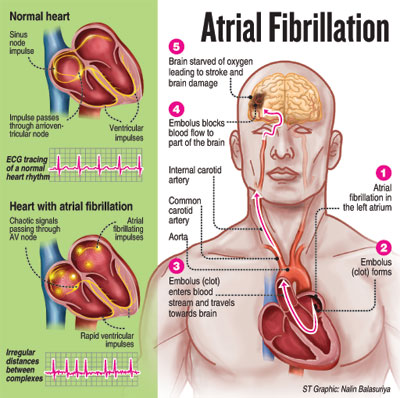Treat atrial fibrillation before it turns deadly
View(s):Want to prevent deadly strokes in the elderly — screen them for the common heart condition, atrial fibrillation (AF), and treat it with anticoagulant medications, a new study has found.
Atrial fibrillation, MediScene learns, is a quivering or irregular heartbeat (arrhythmia) that can lead to blood clots, stroke and heart failure.
As such, an international collaboration, AF-SCREEN, which includes a team headed by an eminent Sri Lankan in Australia, is behind a global push to introduce national screening programmes for AF, which could trigger catastrophic strokes.
The study by AF-SCREEN — a top-level panel of experts across the world — has resulted in a White Paper which has been published on May 9 in ‘Circulation’, the journal of the American Heart Association. The White Paper is titled ‘Screening for Atrial Fibrillation, A Report of the AF-SCREEN International Collaboration’.
 AF is a common and serious heart arrhythmia accounting for one in three strokes in those who are 65 years or older. This happens because the abnormal heart rhythm poses the risk of blood clots forming inside the heart. When clots break off they usually travel to the brain, causing severe strokes. Screening for AF and treating it with anticoagulant medications could prevent many thousands of strokes worldwide each year.
AF is a common and serious heart arrhythmia accounting for one in three strokes in those who are 65 years or older. This happens because the abnormal heart rhythm poses the risk of blood clots forming inside the heart. When clots break off they usually travel to the brain, causing severe strokes. Screening for AF and treating it with anticoagulant medications could prevent many thousands of strokes worldwide each year.
About 10 percent of ischaemic strokes are caused by AF that is first detected at the time of stroke. Asymptomatic AF which underlies these strokes is not uncommon and can easily be detected by simply taking the pulse or by hand-held ECGs which provide a diagnosis in less than a minute.
“Strokes from AF are larger, more severe and harder to survive than other strokes,” says the Director, Neurology & Stroke Services at Australia’s Western Health, Prof. Tissa Wijeratne, pointing out that to be able to protect vulnerable people from ever experiencing a stroke will spare them and their families a lot of heartache.
Statistics from the World Heart Federation show that 15 million people have a stroke each year, nearly six million die and another five million are left permanently disabled.
“Widespread screening for asymptomatic AF in people aged 65 years and above could cost-effectively reduce strokes and their associated disability, and help save lives,” reiterates Prof. Wijeratne. “However, this is not yet widely recommended in guidelines.”
Prof. Wijeratne is a member of AF-SCREEN International Collaboration, comprising over 130 cardiologists, neurologists, general practitioners (GPs), health economists, nurses, pharmacists and patient support organisations from 33 countries. The White Paper recommending the screening of those 65 and over, for AF and treating them with anticoagulants to prevent strokes was written by 60 AF-SCREEN members.
“There is also good evidence that finding asymptomatic AF before symptoms develop and treating it with oral anticoagulants and other therapies, could greatly reduce the increased risk of stroke, and partially reverse the increased risk of associated death,” said Prof. Wijeratne.
Screening has been shown to detect undiagnosed AF in one to three per cent of people aged over 65 to 75 years of age.
Given how easy it is to detect AF and the demonstration of the poor outcomes that can be substantially modified by treatment, AF-SCREEN believes there is a reasonable, cost-effective case to screen for this abnormal heart rhythm in older people in the community, as well as in the clinic.
The White Paper calls for governments worldwide to introduce screening for all older people, at age 65 or possibly older. Programmes could be run through GPs, pharmacies or in the community and could be carried out with pulse checking, a blood pressure monitor or, ideally, a hand-held ECG device, the best tool for rapidly offering a firm AF diagnosis.
Those with concerns about their heartbeat and stroke risk can take action. “If you are aged 65 years or over, then you can see your doctor to check your pulse, or check your own at home to see if it’s regular like a clock,” says Prof. Wijeratne. “If it’s irregular you can have an ECG and get your AF diagnosed and medicated.”
| Fast facts on atrial fibrillation (AF), screening and treatmentAF is responsible for 1/3rd of all strokes. 27% of AF-related strokes (amounting to 10% of all strokes) are not detected prior to stroke because AF is often asymptomatic (no apparent symptoms and unrecognized by the person with AF). AF-related strokes are more severe and cause greater disability than non-AF strokes. Widespread screening for asymptomatic AF among people aged 65 years and over would be a potent way to prevent strokes and the burden of stroke-related harm because AF-related strokes are largely preventable by treatment with oral anticoagulant drugs. It is time to include AF screening in more national and continental guidelines worldwide. | |


